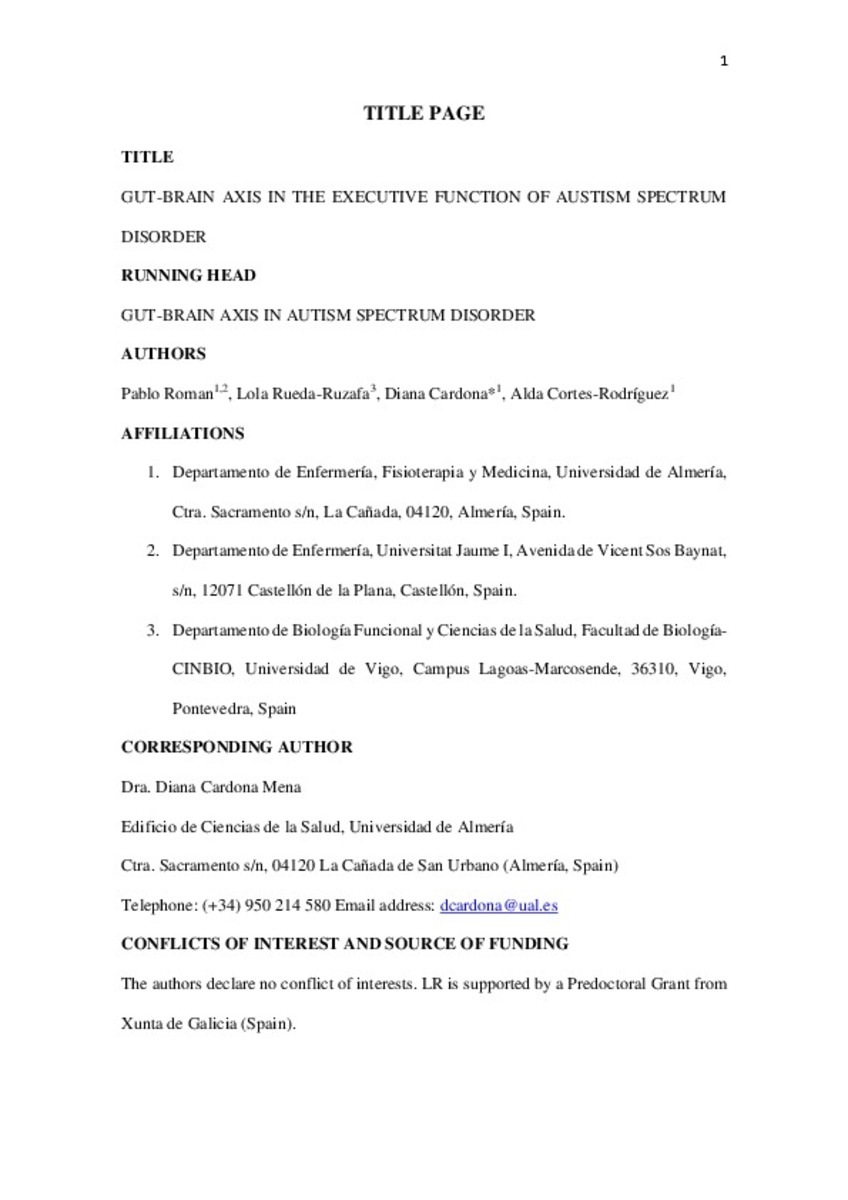Mostrar el registro sencillo del ítem
Gut–brain axis in the executive function of austism spectrum disorder
| dc.contributor.author | Roman, Pablo | |
| dc.contributor.author | Rueda-Ruzafa, Lola | |
| dc.contributor.author | Cardona, Diana | |
| dc.contributor.author | Cortés Rodríguez, Alda Elena | |
| dc.date.accessioned | 2018-10-23T10:35:48Z | |
| dc.date.available | 2018-10-23T10:35:48Z | |
| dc.date.issued | 2018 | |
| dc.identifier.citation | ROMAN, Pablo, et al. Gut–brain axis in the executive function of austism spectrum disorder. Behavioural Pharmacology, 2018, vol. 29, no 7, p. 654-663 | ca_CA |
| dc.identifier.issn | 0955-8810 | |
| dc.identifier.issn | 1473-5849 | |
| dc.identifier.uri | http://hdl.handle.net/10234/176934 | |
| dc.description.abstract | Autism spectrum disorder (ASD) is a neurodevelopmental disorder characterized by impaired communication and social interactions, and repetitive behavioural patterns. These patterns are believed to be dysfunctional symptoms in executive processing, which impact other cognitive functions such as attention or cognitive flexibility. In recent years, several studies have shown that certain intestinal bacteria may play a role in shaping cognitive networks encompassing emotional and social domains. A microbiota–gut–brain axis is known to exist, establishing several mechanisms by which microbiota may modulate brain development, function and behaviour, including immune, endocrine and neural pathways. As the aetiology of ASD is largely unknown, some studies have shown that intestinal bacteria may be involved in its pathogenesis. The aim of this review was to focus on the role of the gut–brain axis in ASD and, specifically, on its role in executive functions. First, we summarize the relationship between the gastrointestinal and cognitive symptoms of ASD patients. In addition, we highlight the evidence that supports and emphasizes the involvement of gut microbiota, and the putative underlying mechanisms in this population. Finally, we present evidence from preclinical and clinical studies on the modulation of microbiota and their effects on cognitive symptoms, specifically in relation to executive function. In conclusion, manipulation of microbiota could be a positive intervention to improve ASD symptoms. However, more research evaluating the role of microbiota in the cognitive symptoms ASD is needed. | ca_CA |
| dc.format.extent | 10 p. | ca_CA |
| dc.format.mimetype | application/pdf | ca_CA |
| dc.language.iso | eng | ca_CA |
| dc.publisher | Lippincott, Williams & Wilkins | ca_CA |
| dc.relation.isPartOf | Behavioural Pharmacology, 2018, vol. 29, no 7 | ca_CA |
| dc.rights | Copyright © Wolters Kluwer Health, Inc. | ca_CA |
| dc.rights.uri | http://rightsstatements.org/vocab/InC/1.0/ | * |
| dc.subject | Gut-microbiota | ca_CA |
| dc.subject | autism | ca_CA |
| dc.subject | cognition | ca_CA |
| dc.subject | diet | ca_CA |
| dc.subject | executive function | ca_CA |
| dc.subject | faecal transplantation | ca_CA |
| dc.subject | microbiome | ca_CA |
| dc.subject | microbiota | ca_CA |
| dc.subject | probiotic | ca_CA |
| dc.title | Gut–brain axis in the executive function of austism spectrum disorder | ca_CA |
| dc.type | info:eu-repo/semantics/article | ca_CA |
| dc.identifier.doi | https://doi.org/10.1097/FBP.0000000000000428 | |
| dc.rights.accessRights | info:eu-repo/semantics/openAccess | ca_CA |
| dc.relation.publisherVersion | https://journals.lww.com/behaviouralpharm/Abstract/2018/10000/Gut_brain_axis_in_the_executive_function_of.10.aspx | ca_CA |
| dc.type.version | info:eu-repo/semantics/submittedVersion | ca_CA |
Ficheros en el ítem
Este ítem aparece en la(s) siguiente(s) colección(ones)
-
INF_Articles [274]
Articles de publicacions periòdiques







